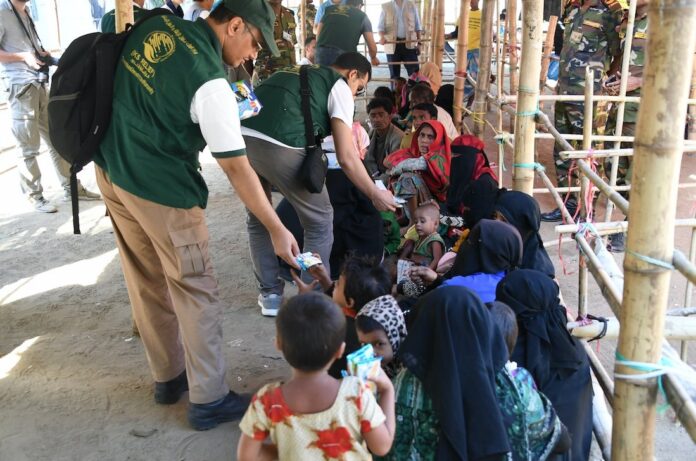DHAKA: When in 2017 Rohingya Muslims fled persecution in Myanmar, most sought shelter in neighboring Bangladesh’s Cox’s Bazar that now has over 1.2 million living in squalid conditions, and where Saudi Arabia is focusing part of its global relief efforts.
The mass arrival of Rohingyas has turned the coastal region of the country’s southeast into the world’s largest refugee settlement, with women and children being the biggest and most vulnerable group dependent on external aid.
Although Bangladesh is not a signatory to the 1951 UN Refugee Convention, it has been hosting and providing humanitarian support for those displaced. But many complex interventions require costly care, and Saudi Arabia has been a key donor.
The King Salman Humanitarian Aid and Relief Center, or KSrelief, has been supporting Rohingya refugees since the beginning of the 2017 military crackdown in Myanmar which triggered their exodus to Bangladesh.
Much of the aid is in the form of emergency, primary and secondary healthcare, as well as obstetric services, which KSrelief has already directly provided to more than 150,000 Rohingya refugee children and mothers.
“KSrelief has been supporting women and children as they are the most affected groups,” the center said in a statement provided for Arab News. “Since the beginning of the Rohingya refugee crisis, KSrelief has been interested in providing support to women and children by evaluating the emergency humanitarian needs and implementing humanitarian projects in the most vital sectors.”
Over $25 million has already been provided for projects, according to KSrelief data, covering food security, shelter, water, sanitation and education.
“We are grateful for the support of donors like KSrelief that has enabled us to reach refugee children and women with critical lifesaving interventions for their health and nutrition,” Dr. Ezatullah Sayed Majeed, chief of UNICEF’s field office in Cox’s Bazar, told Arab News.
Improving maternal and newborn healthcare in the densely populated camps has been a priority for international donors. Babies born in the health facilities supported by UNICEF and KSrelief receive special care and kits with essential items.
“The kit contains a fabric for carrying the baby and sanitary napkins. For the baby the kit has unisex baby clothes, hat, socks, soap, cotton nappies, towel, blanket, (and) baby mosquito net,” Majeed said, adding that this also encourages more women to have their babies delivered by skilled health personnel.
The aid continues after childbirth, as KSrelief has also been enhancing the services and equipment of hospitals in Cox’s Bazar.
According to the center’s data, it has trained over 50 doctors in prevention and control of infectious diseases and obstetric services. Health staffers have performed thousands of surgeries and other procedures.
“The most prominent health services that we provide to the Rohingya refugees are: Supporting access to primary health services, providing treatment and management of child malnutrition cases, strengthening the capacities of health facilities in the Rohingya refugee camps to ensure that emergency health support is available,” the center said.
“Health projects for Rohingya refugees are among the most important pillars of the projects implemented by KSrelief.”
Established in 2015, KSrelief is Saudi Arabia’s humanitarian arm, delivering aid and international relief to crisis-hit communities. It has so far granted UNICEF more than $334 million to support projects in Yemen, Djibouti, Burkina Faso, Lebanon, Somalia, Pakistan and Bangladesh.

